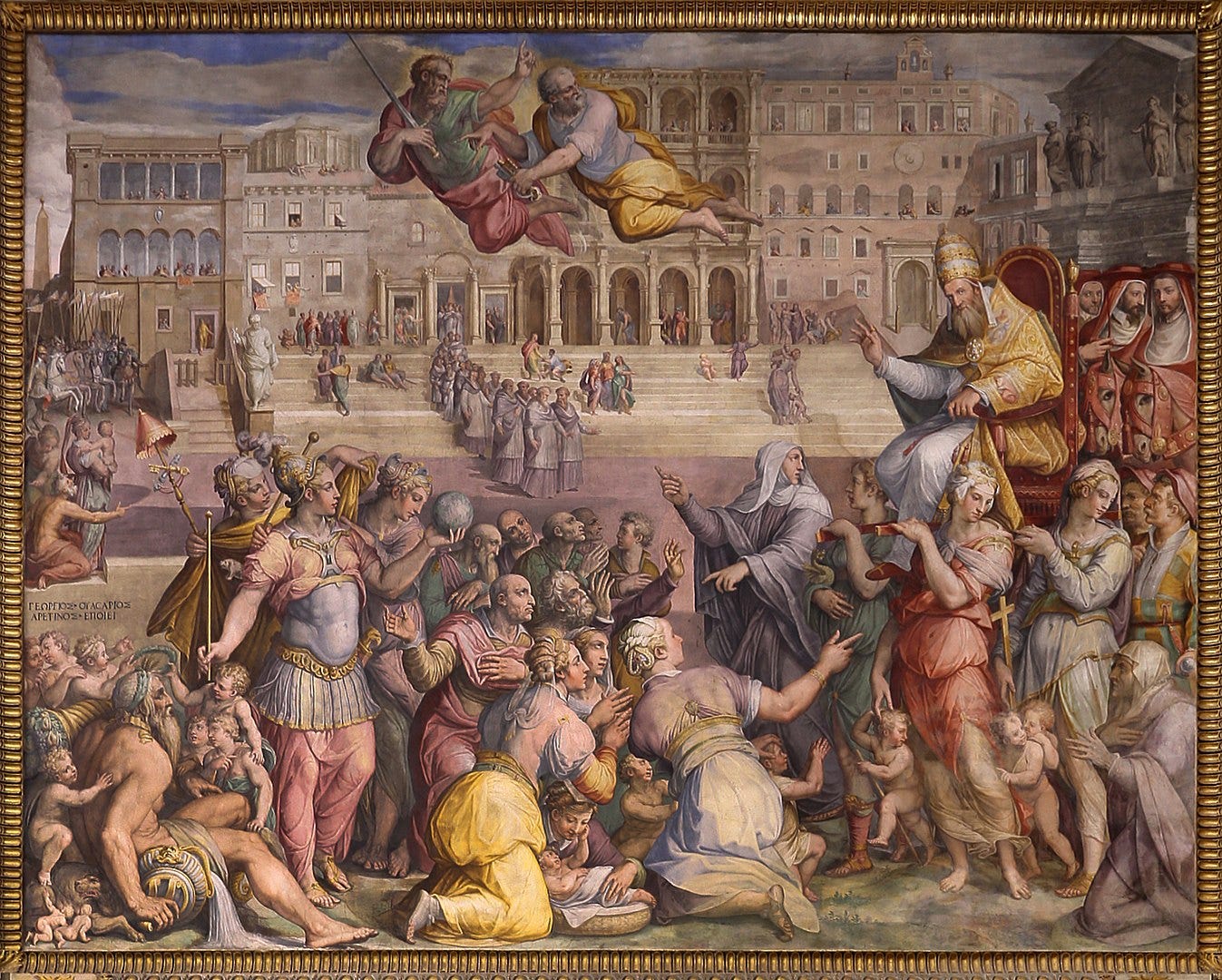How to Speak the Truth in Love
When the most unlikely figure won the ear of the most powerful man in Christendom...
Su, padre, come un uomo! Perché vi dico che non avete motivo di temere.
Up, father, like a man! For I tell you that you have no need to fear.
Born the 24th of 25 children in a family of cloth dyers, Catherine of Siena was an illiterate girl with few worldly prospects — until, that is, she became one of the foremost players in the cutthroat game of medieval politics.
At the time of her birth, the Catholic popes had been in exile in Avignon, France, for 38 years. It was a scandal that shook all of Christendom, as the French crown pulled the strings of the papacy behind the scenes, and Rome was left a chaotic shell of its former self.
In the midst of this disarray, Catherine’s reputation as an ascetic and mystic traveled up the Italian peninsula, over the Maritime Alps, and westwards to the confines of the River Rhône, where it entered Avignon’s Palais des Papes. There it earned her not only the ear, but also the respect of Pope Gregory XI — the captive Vicar of Christ.
Today, on the feast day of Saint Catherine, we tell the story of how one unlikely woman succeeded where all others had failed and convinced Pope Gregory to return the papacy to Rome. We also explore what her story can teach you about awakening from slumber to remember your purpose — even when fear and the forces of the world threaten to consume it…
But first — this summer we are hosting our first ever INVICTUS retreat, The History of Rome as Told by Its Heroes.
Come explore the 5 Ages of Rome with us and learn not just about the Eternal City, but the men who made her great.
There’s only 1 spot remaining, so click below learn more about the retreat and apply today:
The Fire of Faith
Catherine Benincasa was born in the central Italian city of Siena in 1347. From a young age, her life was marked by a special devotion to God — refusing to marry, she instead joined a lay branch of the Dominican order, dedicating her life to service and acts of mercy.
She embraced an austere existence, nursing the sick, serving the poor, and fasting to the extreme. Yet as her reputation for holiness began to spread, not everyone welcomed it. Fearing her mystic visions were signs of delusion rather than sanctity, the local clergy sent a Dominican friar to hear Catherine’s confessions and assess her character.
But the man sent to be Catherine’s judge instead became her greatest advocate. Convinced of the young woman’s holiness, his testimony enabled word of Catherine’s spiritual gifts to travel far beyond Siena. The Dominican network allowed him to distribute her dictated letters, which reinforced the young mystic’s reputation across the Italian city-states.
By the time Catherine had entered her late twenties, her name had reached beyond Tuscany and over the Alps, all the way to Avignon — where a captive pope would soon be in desperate need of her voice…
Persuading the Pontiff
When Catherine’s name first reached the papal court at Avignon, the Church was adrift.
For nearly seventy years now, the popes had abandoned Rome, seeking safety and political advantage in France. In their absence, Rome fell into ruin — its streets governed more by factional violence than by law, and its churches crumbling into disrepair.
Pope Gregory XI knew the scandal could not continue indefinitely. Yet even as pressure from the French crown alleviated and made — at least, in theory — a return to Rome possible, still the threat of assasination, hostile nobles, and inevitable civil unrest gripped him in fear.
Though Catherine had no title or official standing, she began writing to Gregory with a strength few would have dared — yet always tempered by affection and reverence. Addressing the Holy Father tenderly as babbo, she urged him to act with courage and reminded him that the burden he carried was a sacred one.
She was direct, but never harsh; bold, but never disrespectful. It was a fine balance, yet one she managed to strike thanks to her powerful use of imagery:
Voi, dolcissimo babbo, fate come il bambino che, quando la madre vuol svezzarlo, si unge il petto di fiele o d'altro amaro. Il bambino si accosta, e trovando amaro, si ritrae. Ma è ingannato: sotto l'amaro c'è il dolce del latte. Così voi, dolcissimo babbo, siete stato ingannato da una falsa paura: sotto l'amaro della fatica e della persecuzione c'è il latte della dolcezza divina.
You, sweetest father, do as the little child does when the mother wants to wean him, when she anoints her breast with gall or something bitter. The child draws near, but finding bitterness, draws back. Yet he is deceived, for beneath the bitterness is the sweet milk. Thus you, sweetest father, have been deceived by a false fear: beneath the bitterness of toil and persecution is the milk of divine sweetness.
-Caterina da Siena. Le lettere. Edited by Giuliana Cavallini, Libreria Editrice Vaticana, 1970, Letter 74, “A Papa Gregorio XI.”
Catherine acknowledged that Gregory’s concerns about returning to Rome were not entirely unfounded. Yet the more he hesitated, the more his delay became disobedience. If only he could endure the bitterness, Catherine insisted, he would one day taste the sweetness of restored purpose…
The Final Triumph

Gregory had heard Catherine’s words, yet still he wavered in his resolve — not because the dangers were unknown, but because fear had become familiar. It was both easier and more comfortable to remain where he was than to take the uncertain road back to Rome.
Sensing this, Catherine wrote again, pressing him even harder:
Ho pregato, e pregherò, dolce e buono Gesù, che vi liberi da ogni timore servile, e che rimanga in voi solo il santo timore. Che l'ardore della carità sia in voi in modo tale da impedirvi di ascoltare la voce dei demoni incarnati e di seguire il consiglio dei perversi consiglieri, radicati nell'amor proprio, che, come ho inteso, vogliono spaventarvi per impedirvi il ritorno, dicendo: 'Morirete.' Su, padre, come un uomo! Perché vi dico che non avete motivo di temere.
I have prayed, and shall pray, to sweet and good Jesus that He free you from all servile fear, and that holy fear alone remain. May the ardor of charity be in you in such a way to prevent you from hearing the voice of incarnate demons and heeding the advice of perverse counselors, rooted in self-love. They, as I understand, want to alarm you so as to prevent your return, saying: 'You will die.' Up, father, like a man! For I tell you that you have no need to fear.
-Caterina da Siena. Le lettere.
Catherine didn’t promise Gregory ease or victory, but instead reframed the choice before him — to fear man was to be a slave, to fear God was to be truly free. She reminded him instead that the true battle was not with Rome’s chaos, but with the temptation to abandon his purpose.
And so it was that Gregory made his decision.
After a long and cautious journey across the Alps, Pope Gregory XI finally entered Rome in the winter of 1377, ending nearly seventy years of papal exile. The city he found was battered and divided, its streets filled with unrest — within a year, Gregory passed away, worn down by the weight of the struggle.
But his decision to return to Rome changed the course of history. By restoring the papacy to its rightful home, Gregory preserved and reasserted the Church’s spiritual authority at one of its most critical hours. It was a move that, however fragile in its early stages, paved the way for Pope Martin V to finish the job and solidify the popes’ role as stewards of the Eternal City.
As for Catherine, her triumph was never about worldly success. It was about calling a leader back to himself — and helping him endure the bitterness long enough to taste the sweetness of duty fulfilled. Her mission complete, she died three years later at the age of 33.
Takeaways
1) Build a Reputation That Precedes You
Catherine never sought influence, but rather lived a life that commanded it. Her devotion, discipline, and visible authenticity made her impossible to ignore, eventually opening the doors to influence at the highest level of society.
Your reputation is often the only herald you have. Guard it fiercely, and be faithful in the small things.
2) Speak Boldly, but Speak with Love
Catherine’s letters to Gregory were direct, but never cruel. She wielded truth without bitterness, addressing the Holy Father with simultaneous firmness, reverence, and clarity.
The right words, spoken at the right time, can stir even the most fearful heart — but only if they come from a place of charity, not pride.
3) Endure Bitterness to Fulfill Your Purpose
Fear promises safety, but only duty leads to freedom. Catherine understood that hardship is the price of mission — and she urged Gregory to embrace the struggle rather than retreat from it.
When fear tempts you to turn back, remember — you must first endure the bitterness in order to enjoy the sweetness it conceals.
Want to dive deeper?
For more intriguing episodes from the life of Saint Catherine of Siena, join me and James this Thursday at 9am ET as we go live on X.
Visit my X account at 9am to access the livestream — once it ends, the stream will be added to our Members-Only Video Archive for you to catch the replay.
On Thursday, our premium subscribers get a deep dive article exploring what Saint Catherine can teach you about engaging with power politics — and emerging unscathed.
If you’re not already a premium subscriber, please consider joining below:
Ad finem fidelis,
-Evan








Beautiful, Evan. I love the “weaning letter” you included. I’m looking forward to Thursday’s discussion, as always.
God’s blessings and peace to you and yours.
"To fear man was to be a slave, to fear God was to be truly free." - such an awesome quote.